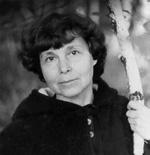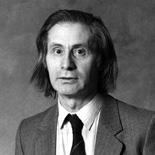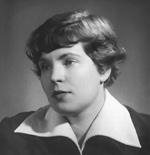THE FLORIDA STATE UNIVERSITY
College of Music presents
Silenced Voices Chamber Music Series:
Polymorphia New Music Ensemble Liliya Ugay, Director with Sahoko Timpone, Mezzo-soprano
Aaron Seiler, Violin; Noël Wan, Harp
Thursday, February 16, 2023
7:30 p.m. | Dohnanyi Recital Hall
Piano Trio No. 3 (1921)
PROGRAM
Aaron Seiler, violin; Samantha Schroeder, cello Liliya Ugay, piano
Garden of Joys and Sorrows (1980)
Crisha Joyner, flute; Jacob Grice, viola Noël Wan, harp
Nikolai Roslavets (1881–1944)
Sofia Gubaidulina (b. 1931)
Serenade for Five Instruments (1968)
Renzo DeCarlo, clarinet; Darrian Lee, violin; Gene Waldron III, double bass
Molly Reid, piano; Alyssa Coleman, percussion
Symphony No. 4 “Prayer” (1987)
Sahoko Timpone, mezzo-soprano; Angela King, trumpet
Liliya Ugay, piano; Alyssa Coleman, percussion
Alfred Schnittke (1934–1998)
Galina Ustvolskaya (1919–2006)
Immersice design created by Bella Schwerin
To Ensure An Enjoyable Concert Experience For All…
Please refrain from talking, entering, or exiting during performances. Food and drink are prohibited in all concert halls. Recording or broadcasting of the concert by any means, including the use of digital cameras, cell phones, or other devices is expressly forbidden. Please deactivate all portable electronic devices including watches, cell phones, pagers, hand-held gaming devices or other electronic equipment that may distract the audience or performers.
Recording Notice: This performance may be recorded. Please note that members of the audience may at times be included in this process. By attending this performance you consent to have your image or likeness appear in any live or recorded video or other transmission or reproduction made in conjunction to the performance.
Health Reminder: The Florida Board of Governors and Florida State University expect masks to be worn by all individuals in all FSU facilities.
Florida State University provides accommodations for persons with disabilities. Please notify the College of Music at (850) 644-3424 at least five working days prior to a musical event to request accommodation for disability or alternative program format.
Nikolai Roslavets (Born in 1881, in Surazh, near Ukrainian border; died in 1944 in Moscow)
The life and the career of one of the most prominent early 20th-century avant-gardist Ukrainian composer Nikolai Roslavets offers an example of a striking downfall caused by the changes in the state’s policies towards the art of music. Roslavets was a son of a railway clerk - facts that he later changed in favor of more “proletarianized” biography, stating that he was born in the remote Russian village Dushatino in a family of peasants. He studied violin and composition at the Moscow Conservatory, from which he graduated in 1912 with a silver medal. It was during his final years in the conservatory when he invented his own harmonic system - the system of what he called synthechords. Roslavets founded the Association of Contemporary Music, and along with Myaskovsky and Sabaneev was one of its most active members. Until the appearance of Russian Association of Proletarian Musicians (RAPM), Roslavets held multiple important positions: he was a main editor of the magazine Muzikalnaya kultura (“Music culture”), a director of Yelets Music School, a rector (head) of Kharkov Music Institute, and head of the Department of tArt Education of the Ukrainian SSR.
In the mid-1920s the newly established RAPM, together with its Moscow Conservatory suborganization, started to attack Roslavets and his music. Roslavets was accused of “bourgeois decadence,” “class hostility,” and formalism. The continuous accusations ended with a so-called “cleanup” - which factually meant a prohibition on one’s professional career. In his search for the rehabilitation, Roslavets moved to Tashkent (Uzbek SSR), where for two years he worked on the first Uzbek ballet. The composer’s return to Moscow was very disappointing and humiliating: he could not get a permanent job, was not paid the honorariums that he had earned, and in addition, was refused membership in the Union of Soviet Composers. Fearing repression and arrest, Roslavets had a stroke in 1939 which was followed by the second stroke in 1942 - this time it resulted in composer’s death. However, even then his enemies did not stop: they ruined Roslavets’s grave. They went after Roslavets manuscripts (the large part of which he hid with his brother in Ukraine), which they found and destroyed.

Sofia Gubaidulina (Born in 1931 in Chistopol, Tatar Republic of the USSR)
A leading member of the post-Shostakovich avant-garde movement in Russia, Sofia Gubaidulina is undoubtedly one of the most prominent composers of our time. After attending the Kazan Conservatory as a composer and pianist, Gubaidulina studied composition with Nikolai Peiko and Vissarion Shebalin at the Moscow Conservatory from 1954 to 1959. For the next fifteen years, she primarily supported herself as a film composer. In 1975, Gubaidulina became a founding member of the “Astreia” ensemble, a group that improvised on rare Russian, Caucasian, and Central Asian folk instruments. Her works often include techniques of sound production that carry listeners beyond the Western tradition. Gubaidulina gained prominence in the West through Gidon Kremer’s presentation of her violin concerto Offertorium in the 1980s, later receiving a major commission from the Internationale Bachakademie Stuttgart to write the Johannes Passion for the “Passion 2000” project in honor of Johann Sebastian Bach. In 2007, she became the first woman to be featured on BBC’s annual “composer weekend” in London. The greatest artists of our time have presented her work, including Anne-Sophie Mutter, Yuri Bashmet, the Berlin Philharmonic, the Chicago Symphony, the New York Philharmonic, the Boston Symphony Orchestra, and the Kronos Quartet. For the past twenty years, Gubaidulina has lived in Hamburg, Germany, where she still resides today. She was awarded an honorary doctorate at Yale in 2009.

Alfred Schnittke (Born in 1934, in Engels, Russia; died in 1998 in Hamburg, Germany)

Alfred Schnittke was a leading Soviet composer from the post-Shostakovich generation. His father was of German-Jewish extraction from Baltic area, and his mother was a Volga German of Catholic background. Schnittke’s first language was German, and from 1945 to 1948 he lived in Vienna where he studied piano and heard much classical music. From 1953 to 1961 he studied at Moscow Conservatoire with Evgeny Golubev (composition) and Nikolai Rakov (orchestration). In 1962 Schnittke began to work as a film composer, eventually writing scores for more than 60 films (including many well-known works). Serious compositions in 1960s showed him mastering various languages of modern music, producing a colorful and expressive synthesis in a work like Sonata for Violin and Piano No. 2 (‘Quasi una sonata’). In 1972 completed Symphony No. 1, a monumental and tragic fresco of collage and stylization, compared to Solzhenitsyn’s The Gulag Archipelago, whose first performance caused conflict with the authorities. Schnittke invented the term ‘polystylism’ to describe such working with different styles. From the late-1970s the composer became increasingly deeply religious. In the 1980s he moved away from ‘polystylism’ towards a more integrated and personal style, as seen in his Viola Concerto and Cello Concerto No. 1. Schnittke’s central to middleperiod output includes many string concertos for the leading players of his day, including Gidon Kremer, Yuri Bashmet, and Mstislav Rostropovich. In 1985 the composer suffered the first of several strokes. From 1989 he and his wife spent more time outside USSR, travelling or living in Hamburg. His last years were marked by the increasing outward fame and inward withdrawal from the world, in pieces like Symphony No. 6 and String Quartet No. 4.
Galina Ustvolskaya (Born in 1919 in Petrograd; died in 2006 in Saint Petersburg)
Galina Ustvolskaya studied composition with Dmitri Shostakovich at the Leningrad Conservatory between 1939 and 1947, during which time she developed a close artistic and personal relationship with him. Shostakovich proclaimed that her music would achieve world fame. In one of his letters to her, Shostakovich stated, “It’s not you who are under my influence, it’s me who is under yours.” Later in life, Ustvolskaya came to publicly scorn Shostakovich’s music and personality. Ustvolskaya’s first compositions were a considerable success and were performed by leading musicians and at the most prestigious concert halls of the city. But already by the 1950s her name had begun to disappear from the concert bills; premieres of her music became increasingly rare, and many of her works were published decades after their composition. Ustvolskaya started to become more and more isolated, since she did not want to participate in social and political life, and her music was too far from the Soviet ideals. And although there were occasional performances of her works (about once a year), the state-owned record label Melodiya was releasing some of her records, and Leningrad’s musical critics praised her talent, the author herself was dissatisfied with the level of performance available at the time. Ustvolskaya renounced most of her works of her earlier period. Instead, she preferred to write music “for the desk drawer,” but to express freely her artistic individuality. She lived in poverty making her living by teaching in the Leningrad Music College (equivalent to a high school specialized in music.) Her music was rarely performed. Finally good fortune came to her: in late 1980s the director of German publishing house Sikorski, Jürgen Köchel, and Dutch musicologist Elmer Schönberger, came to Leningrad and heard her musiс, by which they were enormously impressed. Köchel bought the publication rights on her works, and Schönberger organized a series of concerts of her music in Europe: (1995, 1996, 2005, 2011 in Amsterdam, 1998 in Vienna, 1999 in Bern, 2001 in Warsaw). Conductor, composer, and pianist Reinbert de Leeuw became another important propagandist of her music. Since then, her music has been widely performed in Europe; however, in Russia it was still largely ignored. Nevertheless, Ustvolskaya rejected all proposals for emigration.


